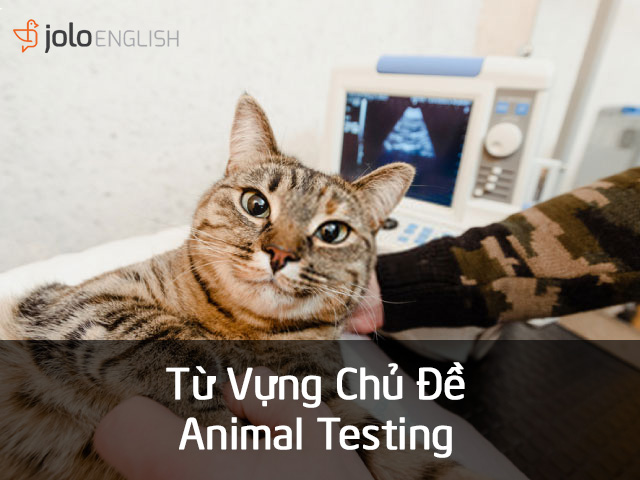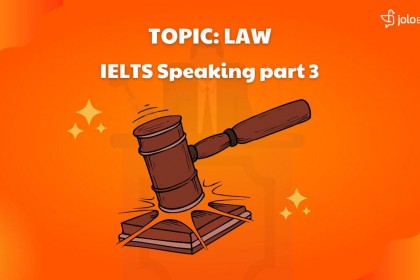Topic Animal Experiments (hay còn được biết đến như Animal Testing) vừa được ra trong đề thi IELTS tại BC và IDP vào ngày 12/10/2019 vừa qua. Topic này tuy không quá mới, nhưng vẫn luôn là vấn đề gây tranh cãi trong xã hội hiện đại và có nhiều khía cạnh thú vị để khai thác. Ở bài viết này, JOLO English sẽ giới thiệu tới bạn tổng hợp những kiến thức cần thiết để hoàn thành bài Writing Task 2 chủ đề này nhé.

CÁC TỪ VỰNG HỮU ÍCH - CHỦ ĐỀ ANIMAL TESTING
Dưới đây là tổng hợp các từ vựng và collocations cần để lập luận một bài IELTS Writing hoàn chỉnh.
- Benefits of animal testing - Những lợi ích của Animal Testing
- To be used to test drugs before they are given to humans: được sử dụng để kiểm tra thuốc trước khi được sử dụng trên con người.
- Study the effects of genetic diseases: nghiên cứu ảnh hưởng của các bệnh di truyền.
- Find out how genes work: tìm hiểu cách thức hoạt động của gen.
- Explore how organisms function: khám phá cách thức hoạt động của các bộ phận.
- Investigate treatments for human diseases: nghiên cứu các phương pháp điều trị bệnh ở người.
- To be essential in the quest to understand human diseases and to develop new treatments: trở nên thiết yếu trong nỗ lực tìm hiểu các căn bệnh ở người và phát triển các phương pháp điều trị mới.
- Advances in the understanding of genetics: những tiến bộ trong sự hiểu biết về di truyền.
- Animals can be bred with specific genetic traits: động vật có thể được nhân giống với những đặc điểm di truyền cụ thể.
- Allow researchers to explore a range of conditions (cancer, heart disease, stroke, dementia): cho phép các nhà nghiên cứu khám phá một loạt các tình trạng bệnh lý (ung thư, bệnh tim, đột quỵ, mất trí nhớ).
- Contribute greatly to scientific advances: đóng góp lớn cho những tiến bộ khoa học.
- Serious medical or life-saving purposes: những mục đích cứu người và mục đích y tế quan trọng.
- A wealth of medical advances: vô số tiến bộ y tế.
- Make with the help of animal research (new vaccines, treatments for cancer, Parkinson’s disease, asthma and HIV): được thực hiện với sự trợ giúp của nghiên cứu động vật (vắc-xin mới, phương pháp điều trị ung thư, bệnh Parkinson, bệnh hen suyễn và HIV).
- Cleared for human use: an toàn cho con người sử dụng.
- Arguments against animal testing - Những tranh cãi chống lại việc thí nghiệm trên động vật
- Cause suffering to animals: gây đau khổ cho động vật.
- Cruel, unethical, meaningless/pointless: độc ác, phi đạo đức, vô nghĩa.
- The differences in physiology, genetics and cell structures between animals and humans: sự khác biệt về sinh lý, di truyền và cấu trúc tế bào giữa động vật và con người.
- Invalidate most cures devised by animal experimentation: vô hiệu hóa hầu hết các phương pháp chữa bệnh được tạo ra bởi thí nghiệm trên động vật.
- Deadly to humans but not to most laboratory animals: gây tử vong cho người nhưng không phải với hầu hết các động vật thí nghiệm.
- Studying HIV in other species: nghiên cứu HIV ở các loài khác.
- May not produce results: có thể không tạo ra kết quả.
- Applicable to humans: áp dụng cho người.
- Animals do not get many of the human diseases that we do: động vật không mắc nhiều bệnh mà chúng ta đang mắc.
- Treatments showing promise in animals: phương pháp điều trị hứa hẹn ở động vật.
- Rarely work in humans: hiếm khi hoạt động trên con người.
- Clear ethical arguments: những tranh luận liên quan đến vấn đề đạo đức.
- The benefits to humans do not justify the suffering caused: những lợi ích mạng lại cho con người không biện minh cho những sự đau đớn nó gây ra.
- Creatures should be respected: mọi loài cần được tôn trọng.
- Một số từ vựng khác
- The breeding of genetically modified animals: việc nhân giống động vật biến đổi gen.
- Non-animal alternative methods: các phương pháp thay thế phi động vật.
- Undergo safety testing involving animals: trải qua thử nghiệm an toàn sử dụng động vật.
- Replace tests with alternative techniques: thay thế các xét nghiệm bằng các kỹ thuật thay thế.
- Introduce human material into animals: đưa các tế bào/ mô… của con người vào động vật.
- Put human breast tumour cells into mice: đưa tế bào khối u ở người vào chuột.
- Allow researchers to test cancer drugs on human tissue: cho phép các nhà nghiên cứu thử nghiệm thuốc ung thư trên mô người.
- Experiment on cell structures instead of whole animals: thí nghiệm trên cấu trúc tế bào thay vì trên toàn bộ cơ thể động vật.
- Use computer models: sử dụng mô hình máy tính.
- Study human volunteers: nghiên cứu tình nguyện viên là con người.
- Use epidemiological studies: sử dụng nghiên cứu dịch tễ học.
- May be a necessary evil: có thể là một điều ác cần thiết.
BÀI MẪU GỢI Ý
Sau đây là một bài mẫu band 9.0 do cựu giám khảo Simon về đề tài Animal Testing để các bạn tham khảo nhé.
Nowadays animal experiments are widely used to develop new medicines and to test the safety of other products. Some people argue that these experiments should be banned because it is morally wrong to cause animals to suffer, while others are in favour of them because of their benefits to humanity.
Discuss both views and give your own opinion.
It is true that medicines and other products are routinely tested on animals before they are cleared for human use. While I tend towards the viewpoint that animal testing is morally wrong, I would have to support a limited amount of animal experimentation for the development of medicines.
On the one hand, there are clear ethical arguments against animal experimentation. To use a common example of this practice, laboratory mice may be given an illness so that the effectiveness of a new drug can be measured. Opponents of such research argue that humans have no right to subject animals to this kind of trauma, and that the lives of all creatures should be respected. They believe that the benefits to humans do not justify the suffering caused, and that scientists should use alternative methods of research.
On the other hand, reliable alternatives to animal experimentation may not always be available. Supporters of the use of animals in medical research believe that a certain amount of suffering on the part of mice or rats can be justified if human lives are saved. They argue that opponents of such research might feel differently if a member of their own families needed a medical treatment that had been developed through the use of animal experimentation. Personally, I agree with the banning of animal testing for non-medical products, but I feel that it may be a necessary evil where new drugs and medical procedures are concerned.
In conclusion, it seems to me that it would be wrong to ban testing on animals for vital medical research until equally effective alternatives have been developed.
Với những gợi ý trên, hi vọng rằng các bạn sẽ chuẩn bị thật tốt cho dạng đề này và đạt kết quả cao trong thi IELTS sắp tới nhé!
-----------------------------------------
Tìm hiểu thêm các khóa học tại GLN / JOLO English - Hệ Thống Trung Tiếng Anh và Luyện Thi IELTS uy tín nhất tại Hà Nội và HCM :
- Khóa học Luyện Thi IELTS tại Hà Nội và HCM
- Khóa học Tiếng Anh Giao Tiếp cho người đi làm tại Hà Nội và HCM
- Khóa học Tiếng Anh cho trẻ em
Hệ Thống Trung Tâm Anh Ngữ GLN / JOLO:
- Hà Nội: (024) 6652 6525
- TP. HCM: (028) 7301 5555
- JOLO: Số 4, ngõ 54 Nguyễn Thị Định, Hà Nội
- JOLO: Số 27 Trần Đại Nghĩa, Hà Nội
- JOLO: Biệt thự B8, ngõ 128 Thụy Khuê, Hà Nội
- JOLO: Số 7, đường số 2, Cư Xá Đô Thành, Q.3, Tp.HCM
- JOLO: Số 2, tầng 1, tòa C2, Vinhomes Central Park, Q. Bình Thạnh, TP.HCM
- GLN: Tầng 1 & 12, Tòa nhà Handico Phạm Hùng, Mễ Trì, Từ Liêm, Hà Nội
- GLN: Tầng 1 & 8, Tòa nhà Coalimex 33 Tràng Thi, Hoàn Kiếm, Hà Nội




















![[VOCABULARY]I Tổng Hợp Các Món Ăn Ngày Tết Bằng Tiếng Anh vocabulary-i-tong-hop-cac-mon-an-ngay-tet-bang-tieng-anh](/images/cache/c8918c9277ae3cddbeabdb30dd97c92f_w420_h280_cp.png)

